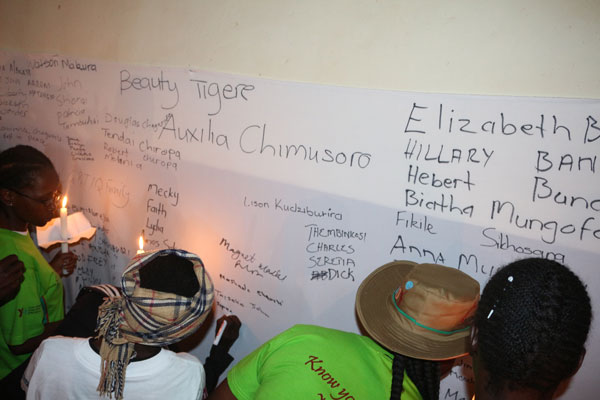
Minister of State for Mashonaland Central Provincial Affairs Monica Mavhunga has called on citizens to embrace government efforts in suppressing the worsening of the HIV and Aids epidemic by initiating the “test and treat” strategy.

The call comes at a time the plan has yielded good results by increasing the number of people introduced to antiretroviral treatment (ART) when they test HIV-positive in the country.
Test-and-treat is an intervention strategy in which the population at risk is screened for HIV infection and diagnosed HIV-infected individuals receive early treatment, aiming to eliminate HIV as it reduces the rate of spreading the virus to other people.
Addressing hundreds of people who attended the International Aids Candle Light Day ceremony in Glendale, Mazowe, recently said a joint effort would go a long in the achievement of the national target to have 90% of all people living with HIV on treatment.
“We call upon all of you to join us in this effort because without your involvement and stronger working relationship with you and other stakeholders, this new way of intensifying the fight against HIV will not work,” said Mavhunga.
“We should work together now more than ever to sustain and revitalise our global efforts for a future free of HIV-related stigma and discrimination.”
Running under the theme Reflecting on our past, preparing for our future, the event, which took place on the eve of the annual World Aids Day, was organised by National Aids Council in conjunction with its partners.
- Chamisa under fire over US$120K donation
- Mavhunga puts DeMbare into Chibuku quarterfinals
- Pension funds bet on Cabora Bassa oilfields
- Councils defy govt fire tender directive
Keep Reading
“The memorial emphasises the need for people living with and affected by HIV to join hands and reflect on the past and precious lives that have been lost,” explained Mavhunga, adding that it was a way of passing knowledge to the next generation.
“It also calls for us to share our stories of challenges and victory to educate the next generation on what the Aids movement has achieved over the last three decades.”
Zimbabwe National Network for People Living with HIV and Aids vice-chairperson Moreni Masanzu echoed the same sentiments.
“This memorial calls for leaders to support the future of people living with HIV and we can choose what the candles mean to take another’s hand, lift another’s burden or simply acknowledge another’s work,” said Masanzu.
According to the Zimbabwe Population-Based HIV Impact Assessment 2016 results, approximately 1 200 000 aged between 15 and 64 years are currently living with HIV in Zimbabwe.
The International Aids Candlelight Memorial serves as a community mobilisation campaign to raise social consciousness about HIV and Aids.
With over 33 million people living with HIV today worldwide, the International Aids Candlelight Memorial serves as an important intervention for global solidarity, breaking down barriers of stigma and discrimination, and giving hope to new generations.











